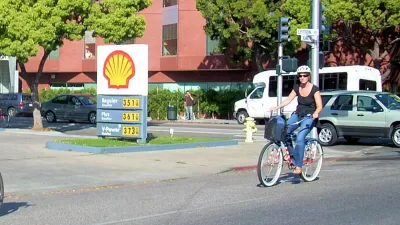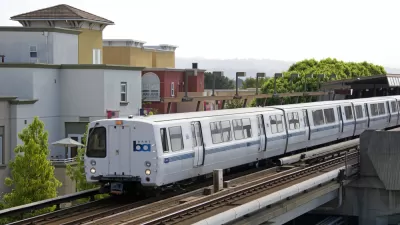The November 8 sales tax measure fell 0.37 percent short, but there's new hope from Sacramento with the reintroduction of a gas tax measure. Democrats now hold the bare supermajority in both the Assembly and Senate needed to pass tax increases.
The magic percentage needed for local transportation tax measures to pass in California is 66.67.
Measure J, a half-cent, 9-year transportation sales tax that would have raised $225 million to fund a panoply of transportation improvements for San Luis Obispo County and its seven cities, including road, transit, and bicycle facilities, came breathtakingly close to passage, receiving 66.30 percent support.
But the likelihood of trying again is not looking good.
It turns out that more than a supermajority of voter support is necessary for a county to increase taxes for transportation, reports Stephanie Finucane for The Tribune. Before voters have their say on a proposed tax measure, it first has to make its way on the ballot.
"The more expeditious route is for a majority of cities and the county Board of Supervisors" to support it, explains Finucane. And a majority of the 5-member Board of Supervisors of San Luis Obispo County do not appear to be in support.
Newly elected county supervisor John Peschong, who would have opposed placing Measure J before voters, offered an alternative route to increased transportation revenues.
Peschong favors uniting with other counties to lobby for improved state funding.
“I think there’s a renewed interest in getting the state to pay for their roads like they have (in the past),” he said.
Gas tax legislation
Finucane reports that state Sen. Jim Beall (D-San Jose), chair of the Senate Committee on Transportation and Housing, introduced SB 1: Transportation funding on Dec. 6 which would "pump an additional $6 billion annually into road repairs and mass transit," according to Sen. Beall's office, by:
- Increasing the per-gallon gas tax by 12 cents in phases over three years
- Ending the Board of Equalization’s annual adjustment of the price-based per-gallon gas excise tax rate to 17.3 cents
- Increasing the diesel excise tax by 20 cents and the sales tax [on diesel] by 4 percent
- Enacting an annual $100 fee on zero-emission vehicles
- Increasing the annual registration fee for all vehicles by $38 per vehicle
[See current state excise tax rates and sales and use tax rates on fuels here (PDF)].
Similar legislation was introduced in the Assembly as AB 1 by Assemblyman Jim Frazier (D-Oakley, Contra Costa County), chair of the Assembly Transportation Committee.
Democrats gain supermajority in both houses of the legislature
While the election was held Nov. 8, it was the outcome of a tight senatorial race in a district mainly in Orange County and small parts of San Bernardino and Los Angeles counties that was finally called on Nov. 28 that gave the Democrats the supermajority they sought. [Democrat Josh Newman won with 50.39 percent of the vote.] Democrats earlier won a supermajority in the Assembly with the defeat of three Republican incumbents.
Democrats can now, theoretically, raise taxes, assuming the governor doesn't veto the bill, which is a safe assumption since the Gov. Jerry Brown announced in his 2015 inauguration the need to address the $59 billion transportation shortfall. He repeated the goal the following year, though the figure had grown to $77 billion.
SB 1's predecessor was SB X1-1, introduced in a special session in August 2015, ultimately met the same fate as it's predecessor, SB 16. Both bills, authored by Beall, died for lack of supermajority support. Republicans were adamant in their opposition to raising fuel taxes.
However, there are divisions in the Democratic party as well that surfaced with SB 350, which the oil industry successfully exploited, resulting in the stripping of the vital oil reduction part of the bill.
So-called "moderate Democrats" were worried that the provision would raise gas taxes, not exactly a good omen for a gas tax bill that will need every Democratic vote to achieve the two-thirds requirement necessary for tax increases.
+++++++++++++++++++++++++++
Streetsblog California: Repeat Until Complete: Transportation, Housing Bills Reintroduced, December 7, 2016
What it Takes To Pass a Transportation Sales Tax Measure in California, December 6, 2016: Ventura County's transportation sales tax measure failed after receiving almost 57 percent of the vote, illustrating the difficulty in passing tax measures intended for transportation improvements in California.
Hat tip to AASHTO Daily Transportation Update.
FULL STORY: Defeat of sales tax puts SLO County transportation projects at risk

Study: Maui’s Plan to Convert Vacation Rentals to Long-Term Housing Could Cause Nearly $1 Billion Economic Loss
The plan would reduce visitor accommodation by 25,% resulting in 1,900 jobs lost.

Alabama: Trump Terminates Settlements for Black Communities Harmed By Raw Sewage
Trump deemed the landmark civil rights agreement “illegal DEI and environmental justice policy.”

Why Should We Subsidize Public Transportation?
Many public transit agencies face financial stress due to rising costs, declining fare revenue, and declining subsidies. Transit advocates must provide a strong business case for increasing public transit funding.

Paris Bike Boom Leads to Steep Drop in Air Pollution
The French city’s air quality has improved dramatically in the past 20 years, coinciding with a growth in cycling.

Why Housing Costs More to Build in California Than in Texas
Hard costs like labor and materials combined with ‘soft’ costs such as permitting make building in the San Francisco Bay Area almost three times as costly as in Texas cities.

San Diego County Sees a Rise in Urban Coyotes
San Diego County experiences a rise in urban coyotes, as sightings become prevalent throughout its urban neighbourhoods and surrounding areas.
Urban Design for Planners 1: Software Tools
This six-course series explores essential urban design concepts using open source software and equips planners with the tools they need to participate fully in the urban design process.
Planning for Universal Design
Learn the tools for implementing Universal Design in planning regulations.
Smith Gee Studio
Alamo Area Metropolitan Planning Organization
City of Santa Clarita
Institute for Housing and Urban Development Studies (IHS)
City of Grandview
Harvard GSD Executive Education
Toledo-Lucas County Plan Commissions
Salt Lake City
NYU Wagner Graduate School of Public Service





























